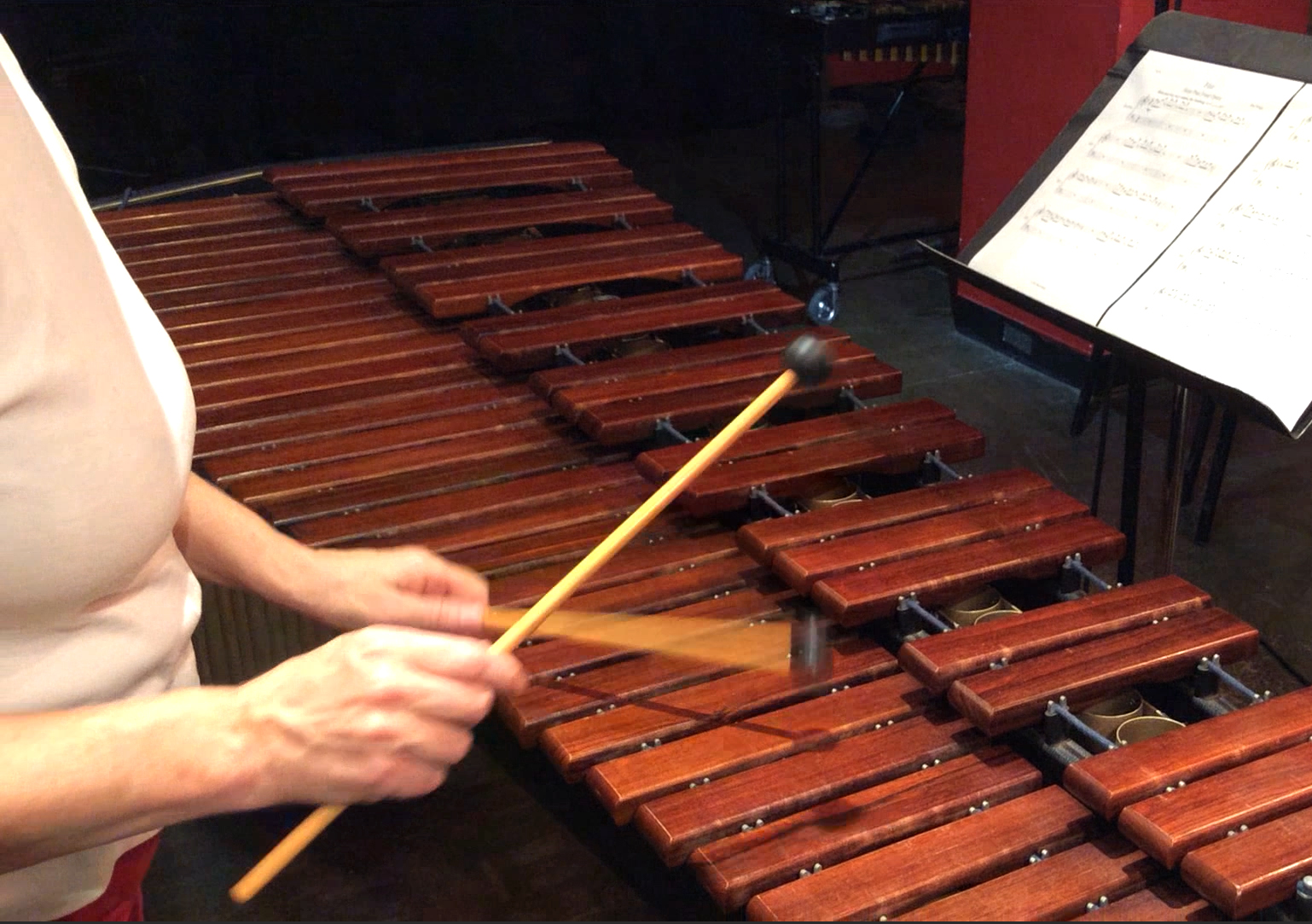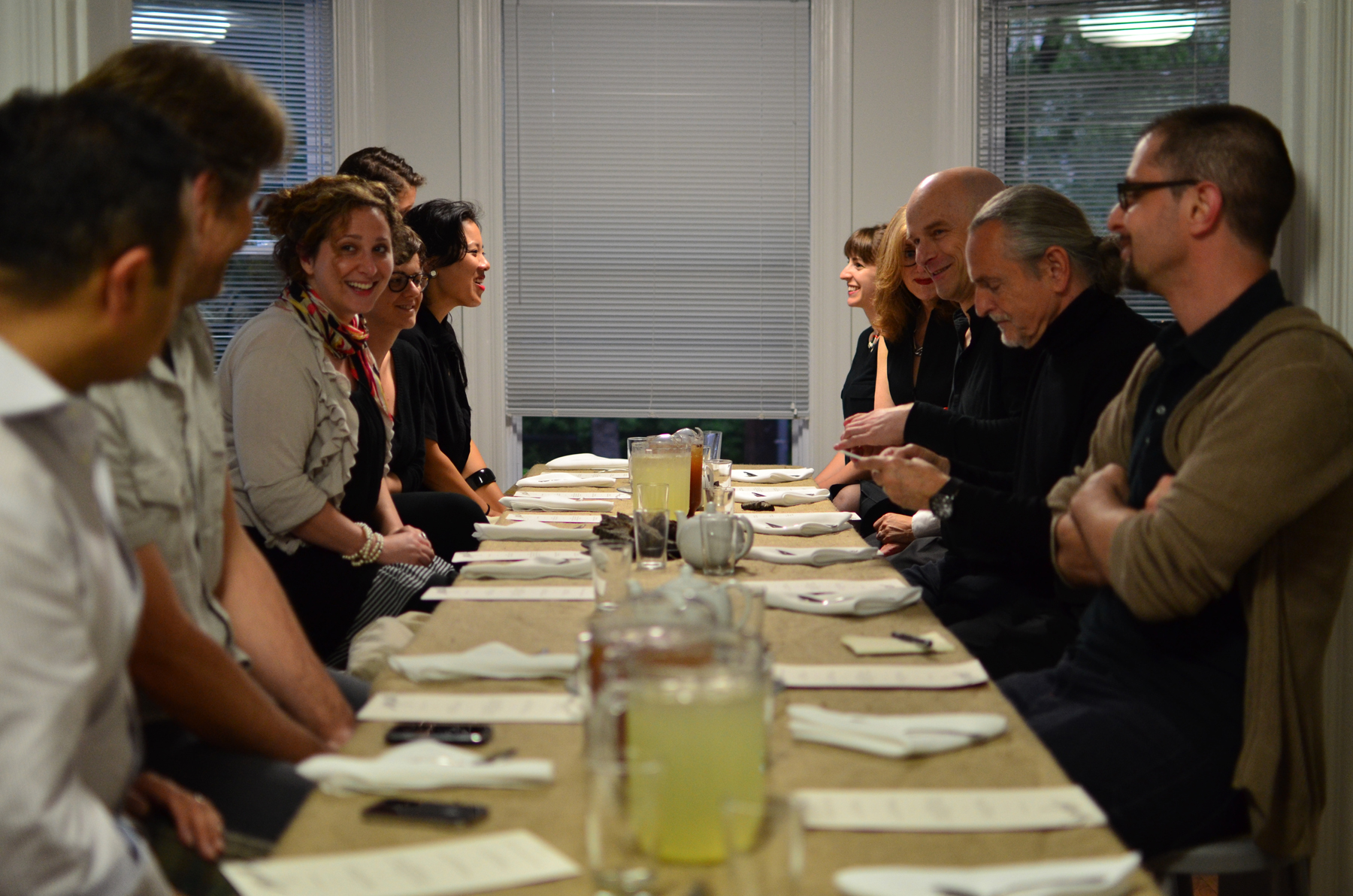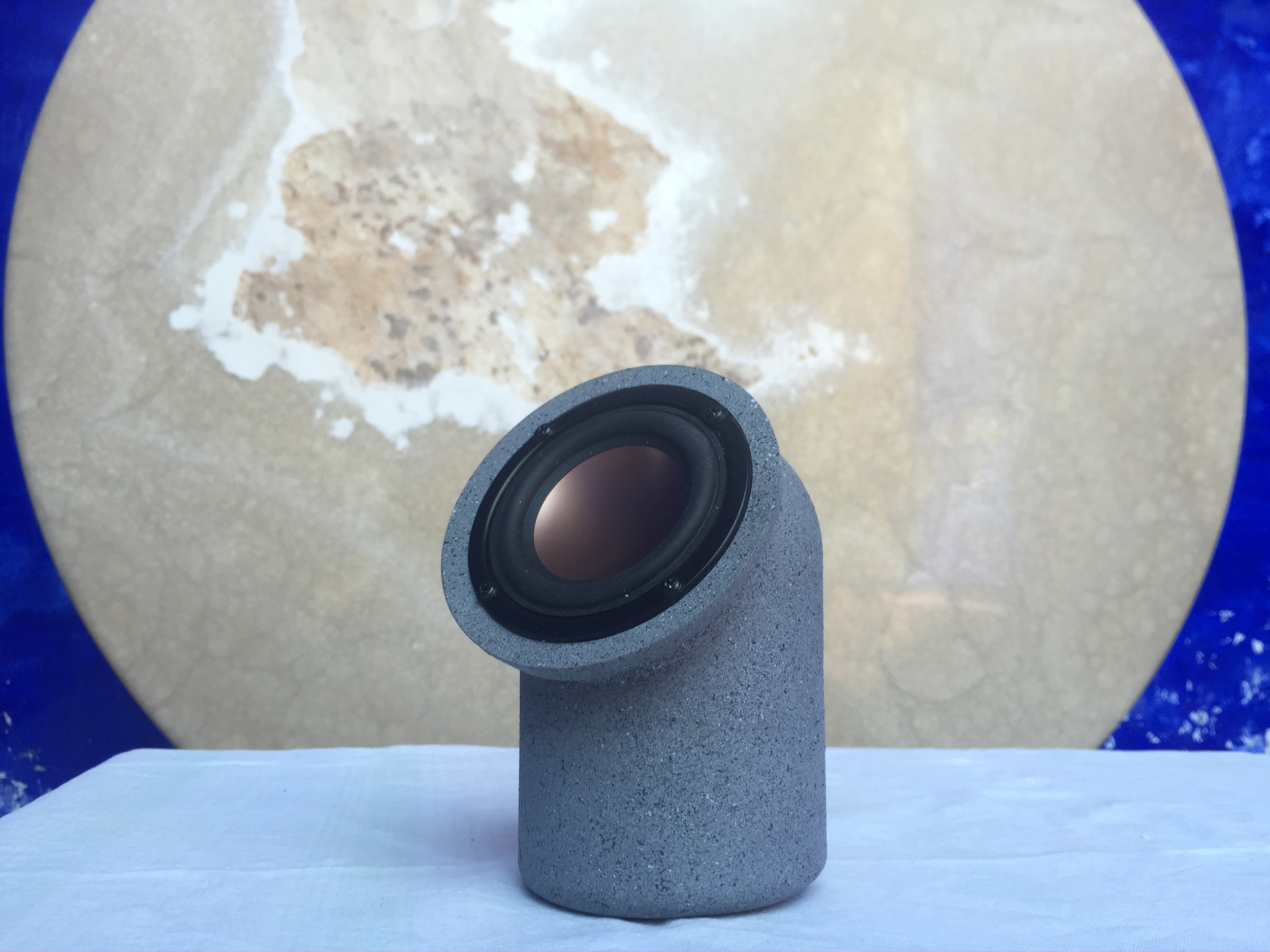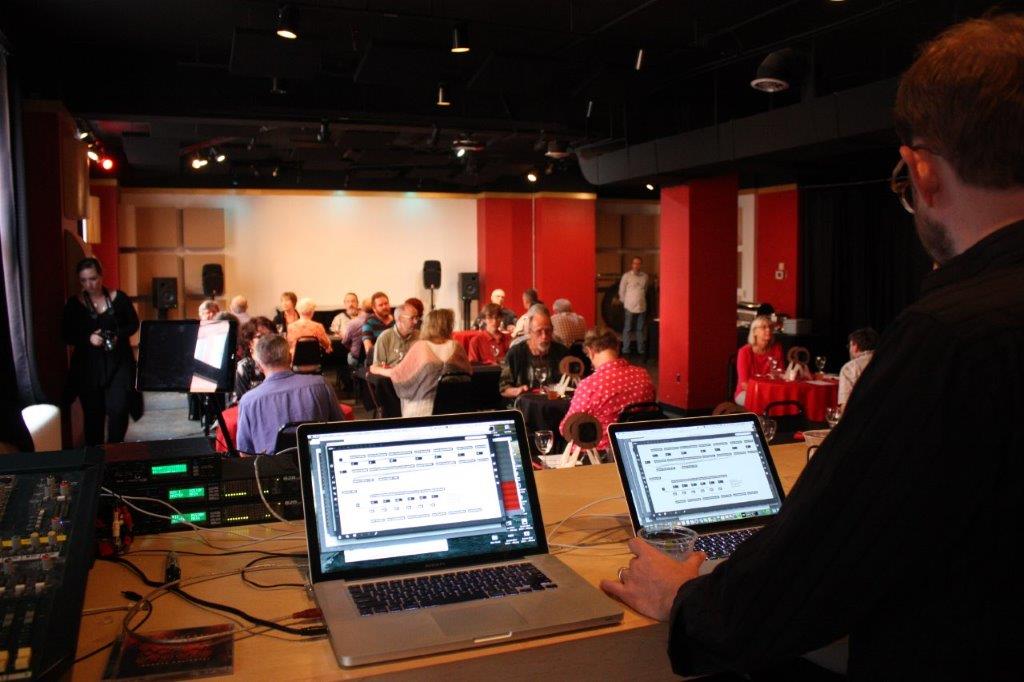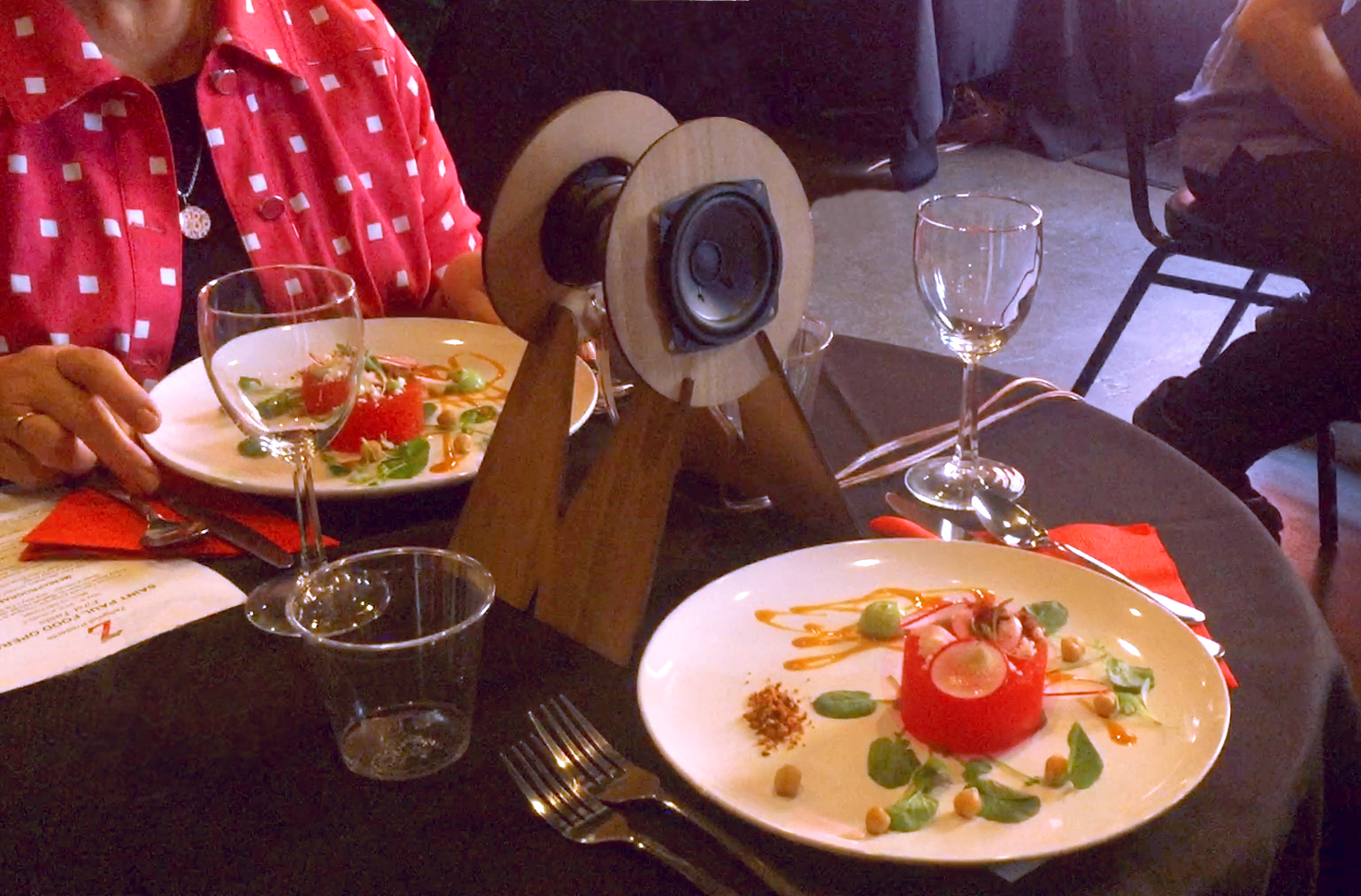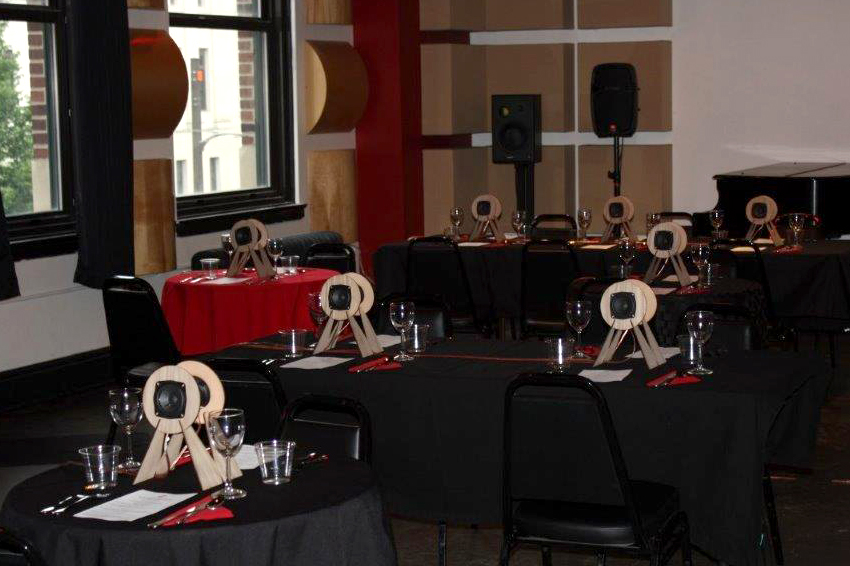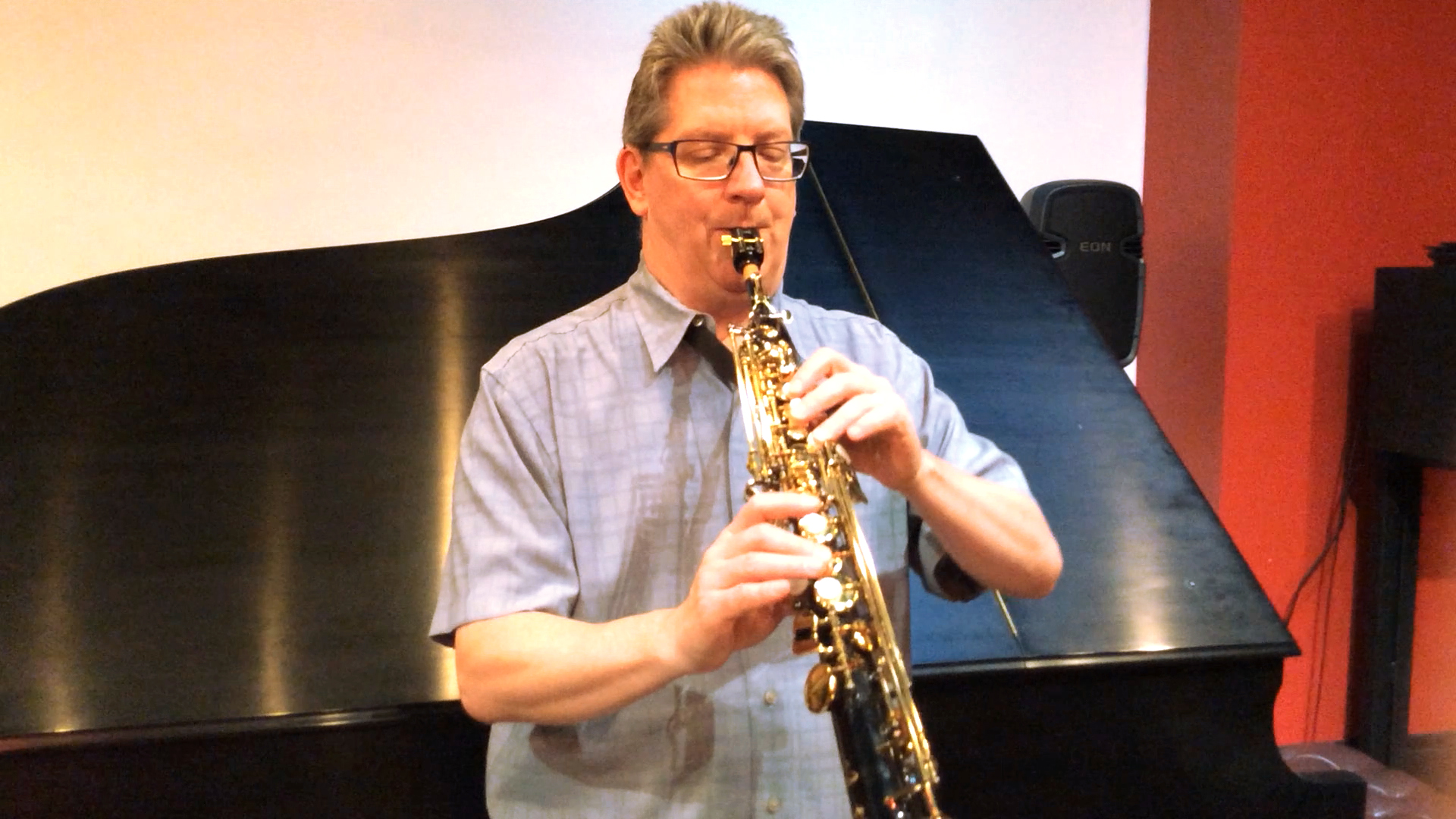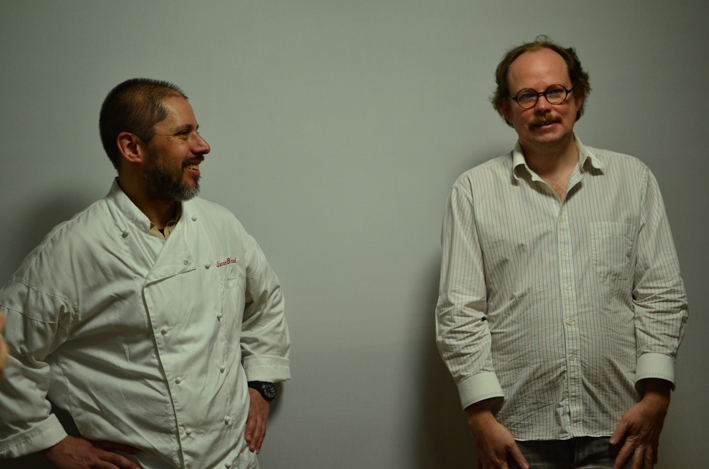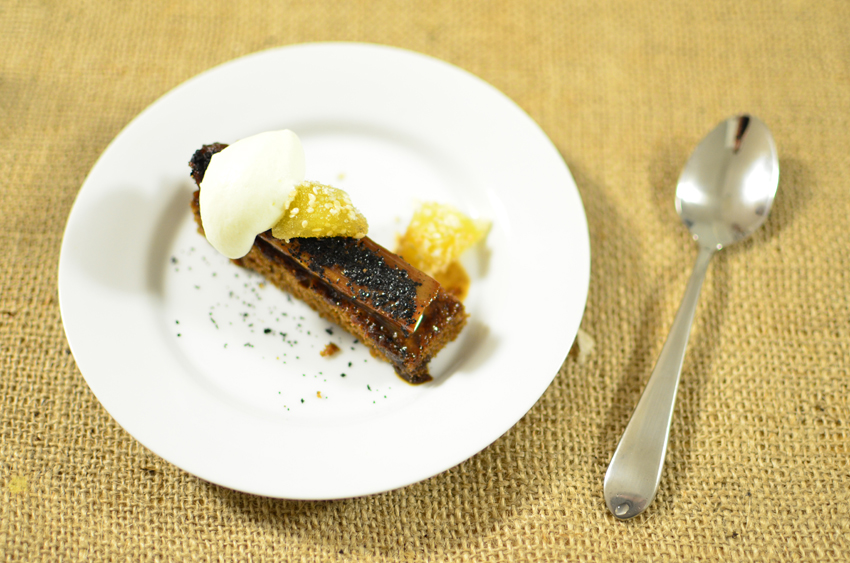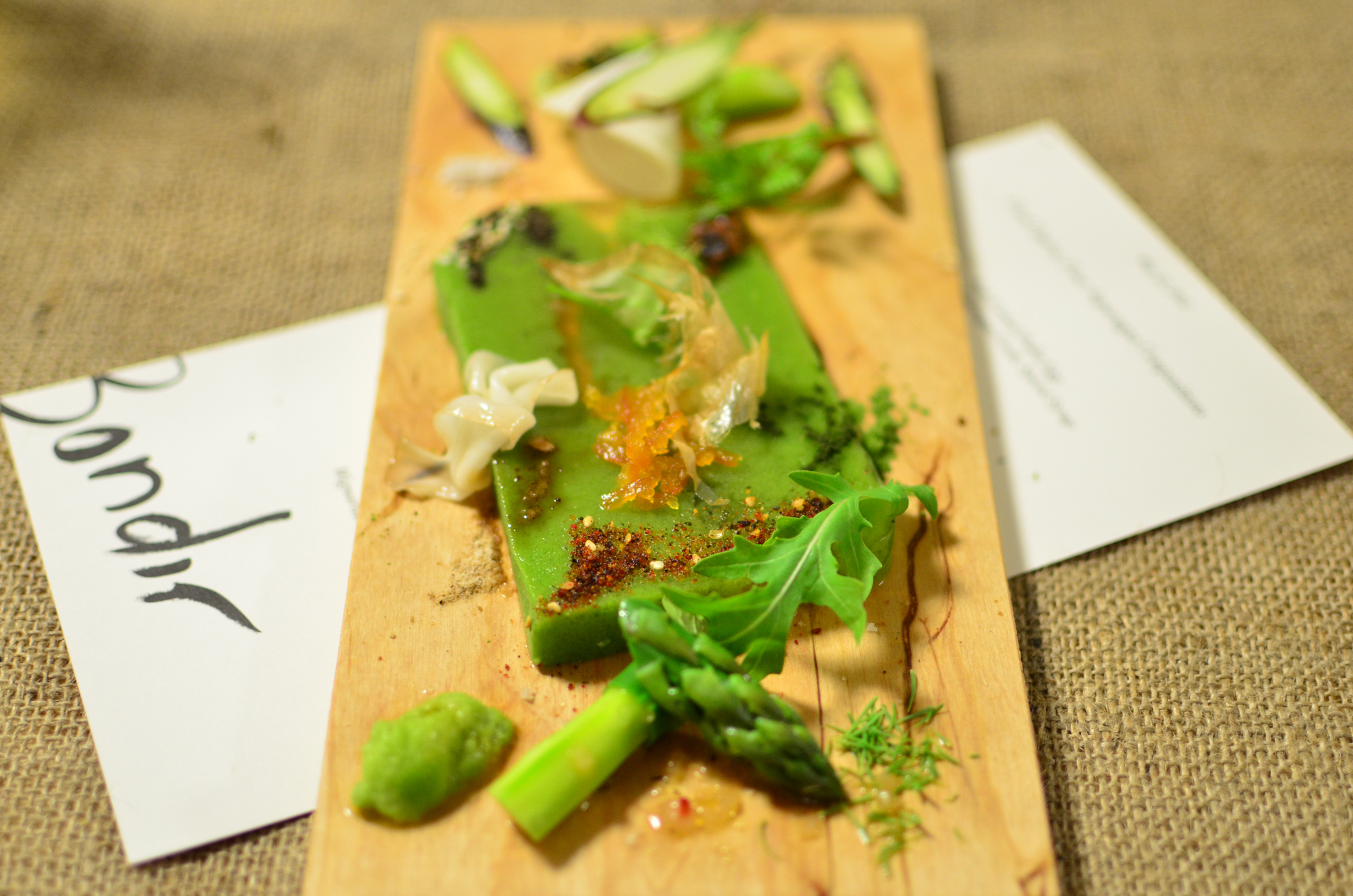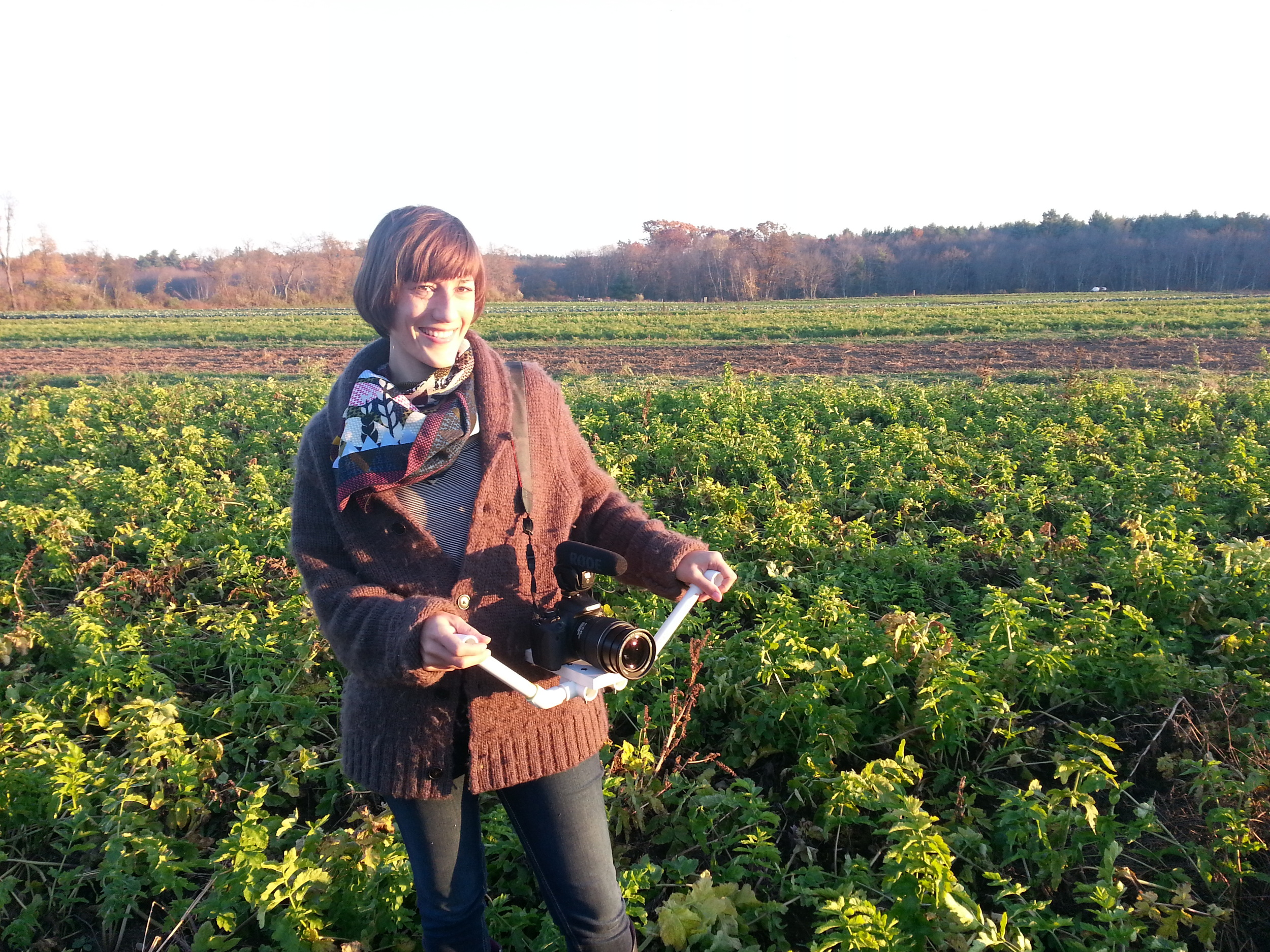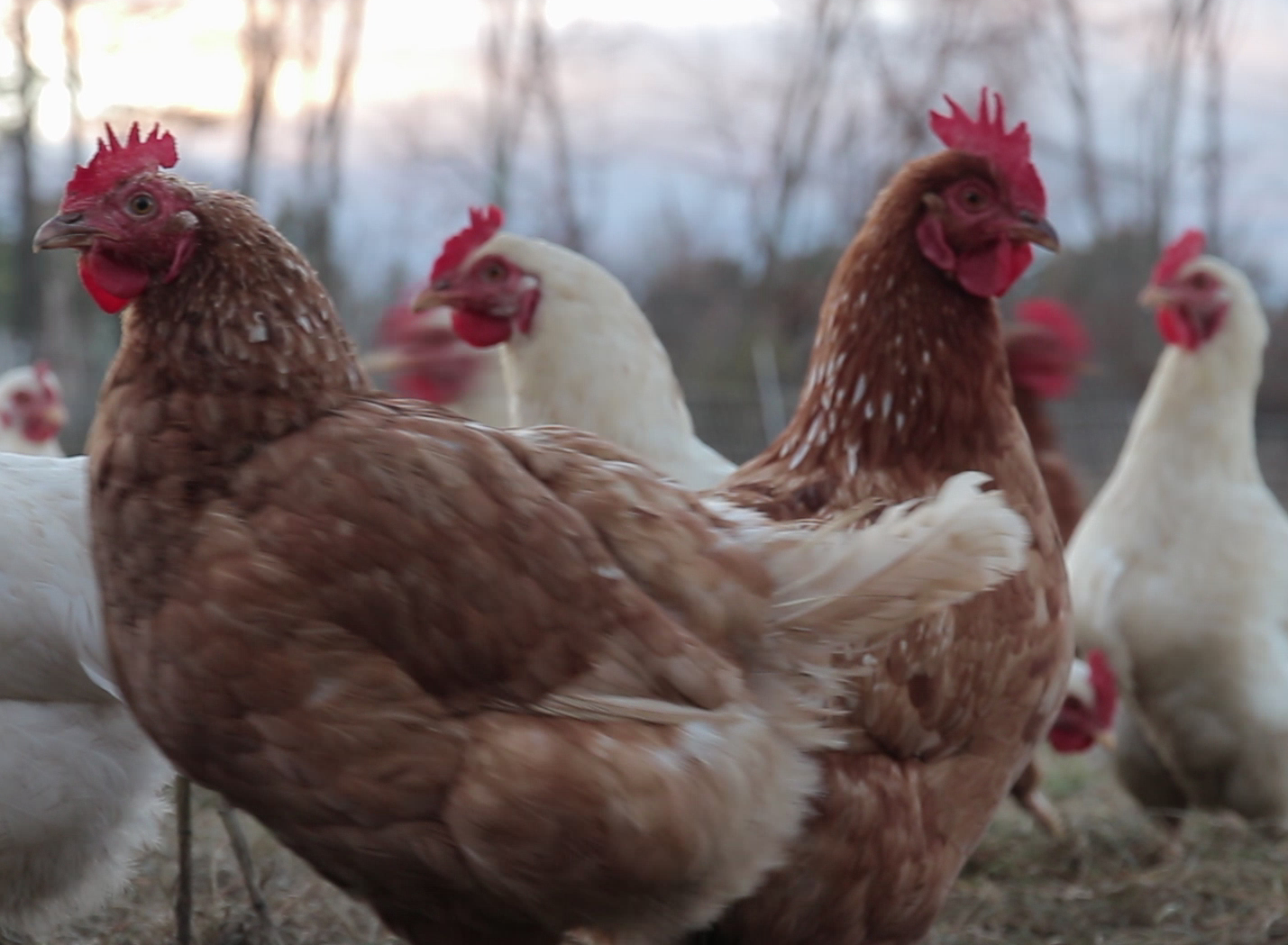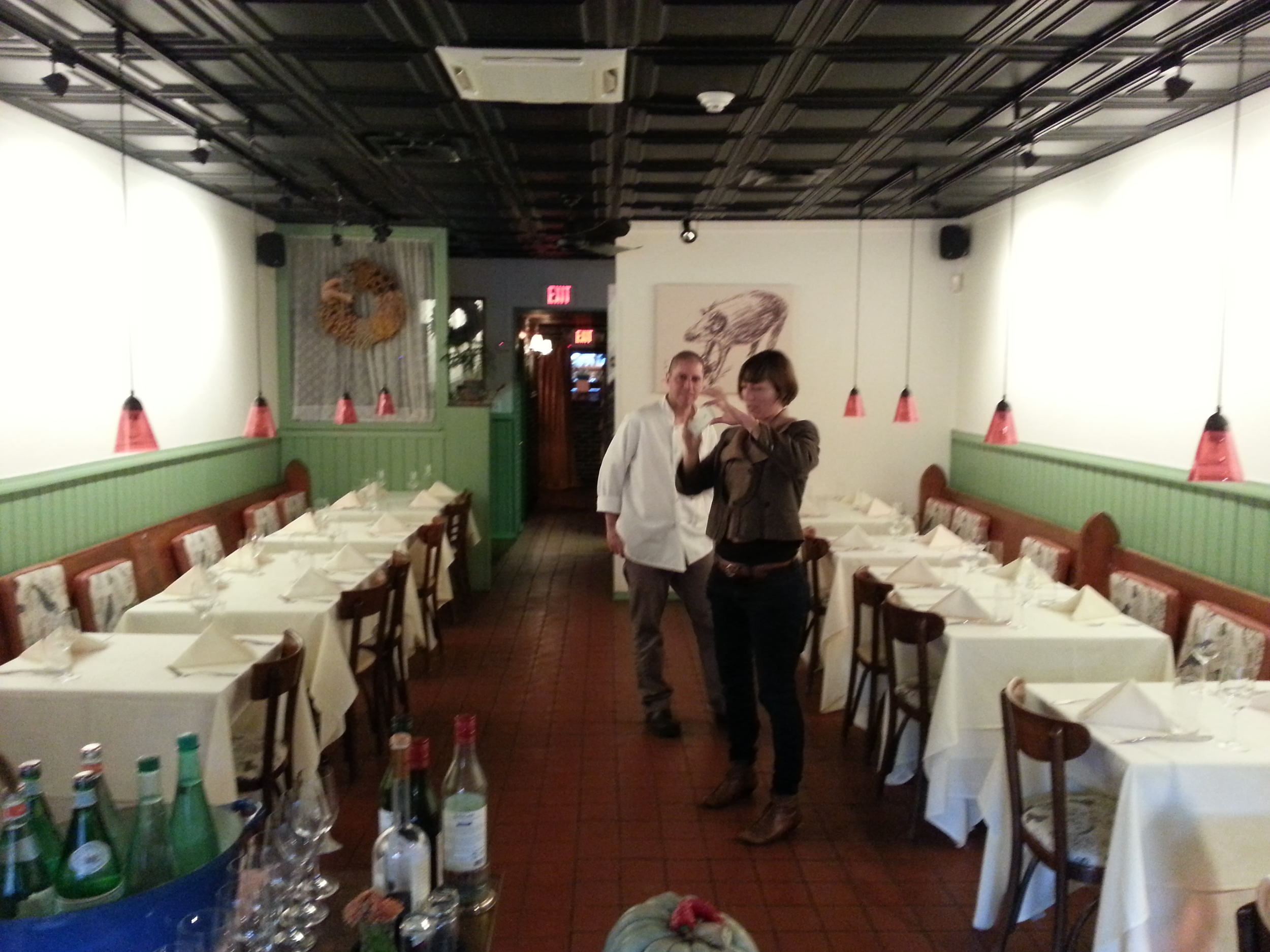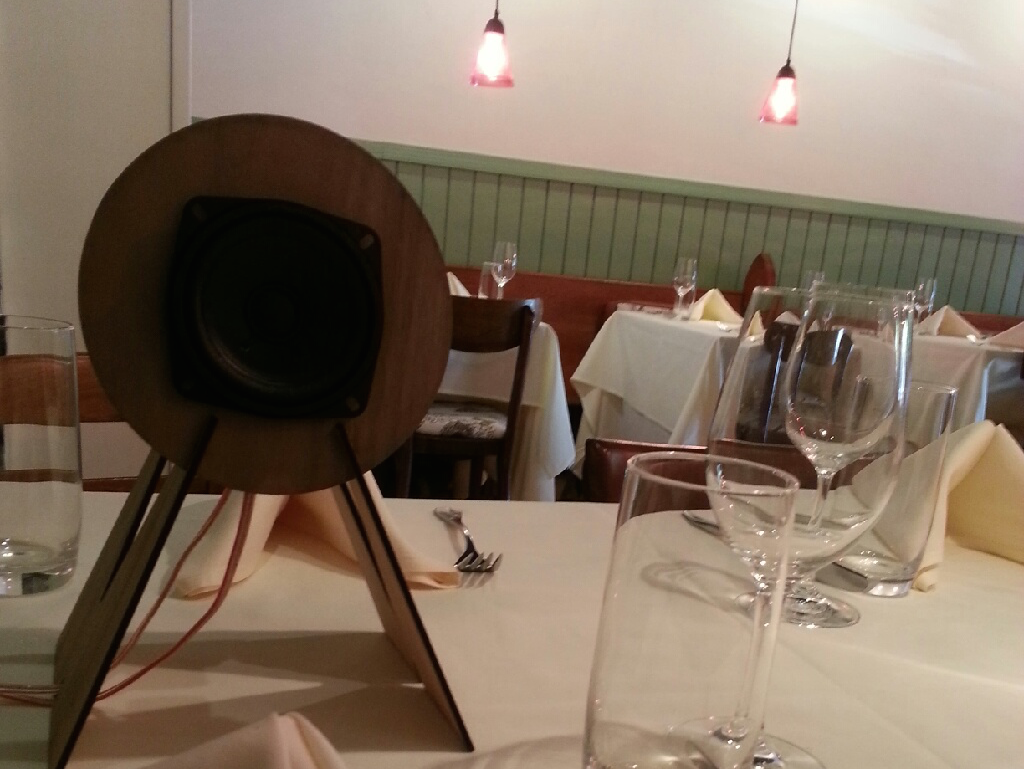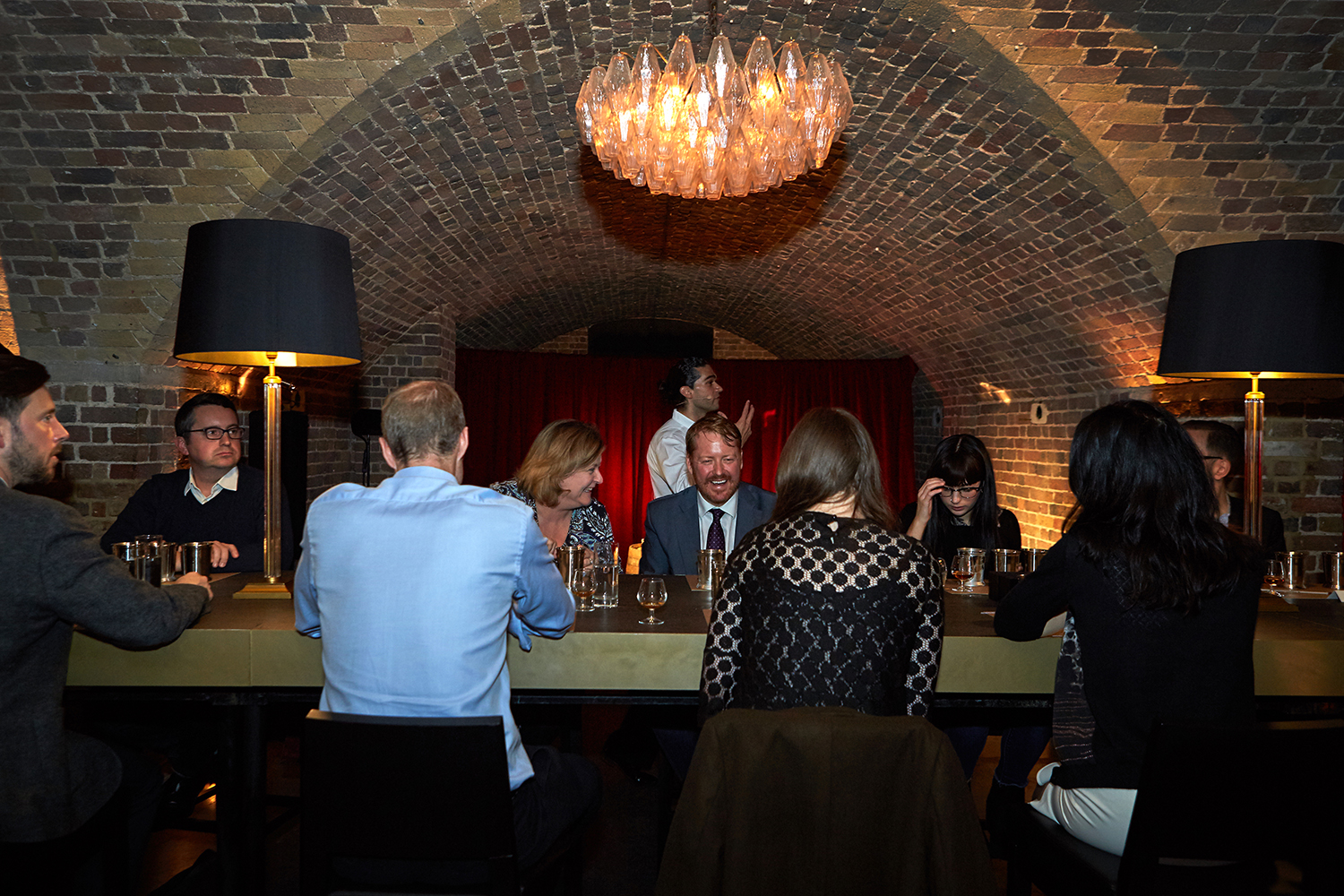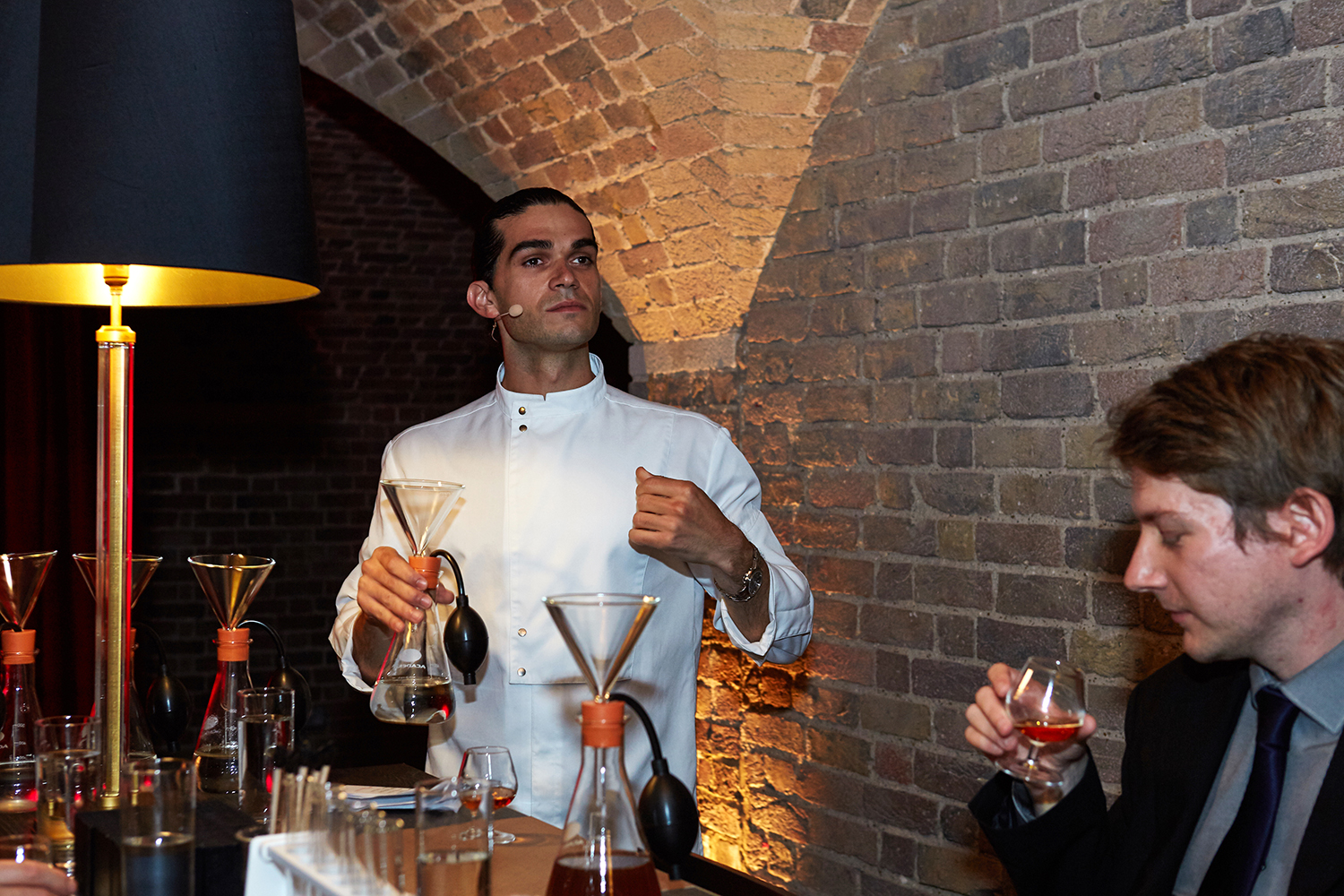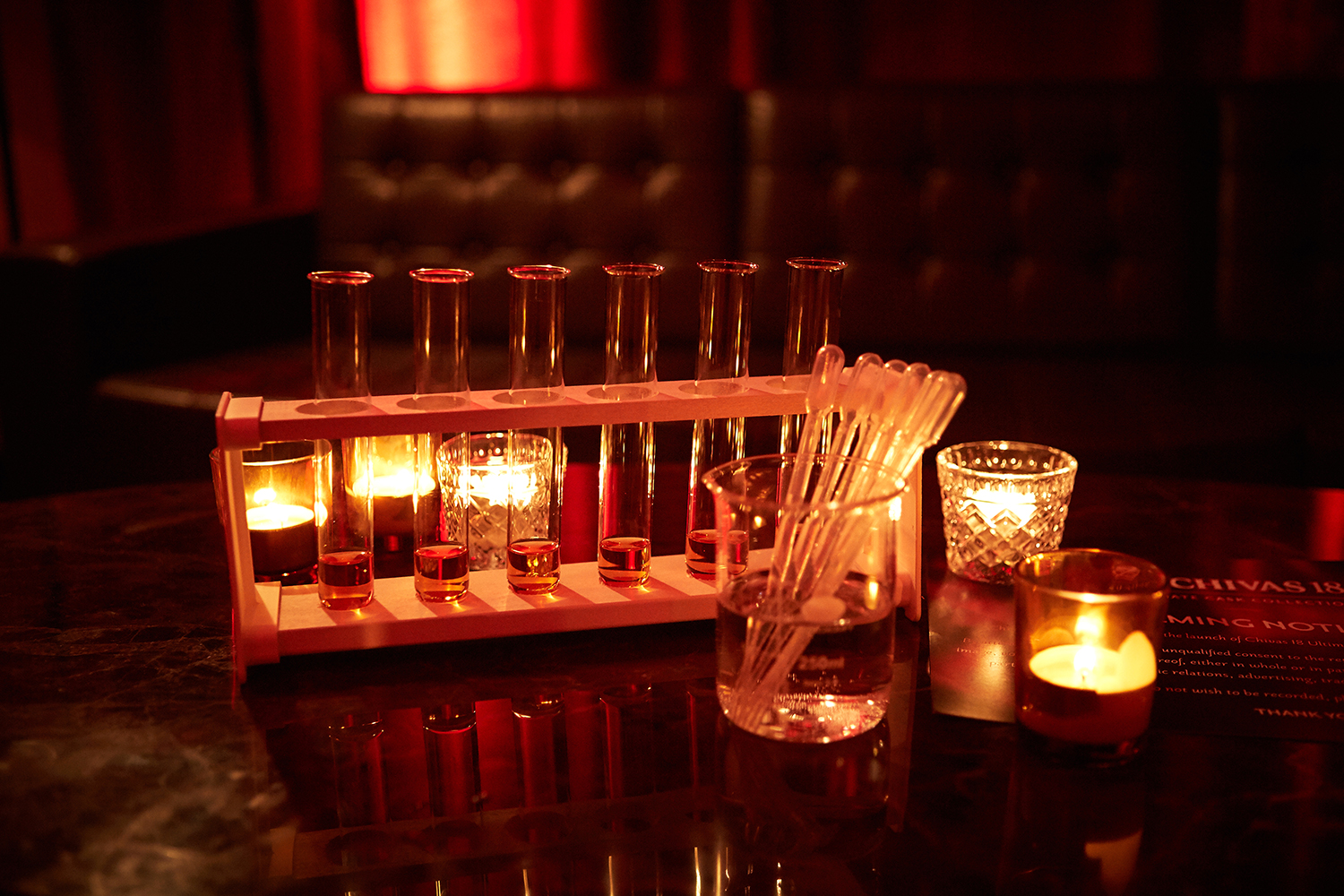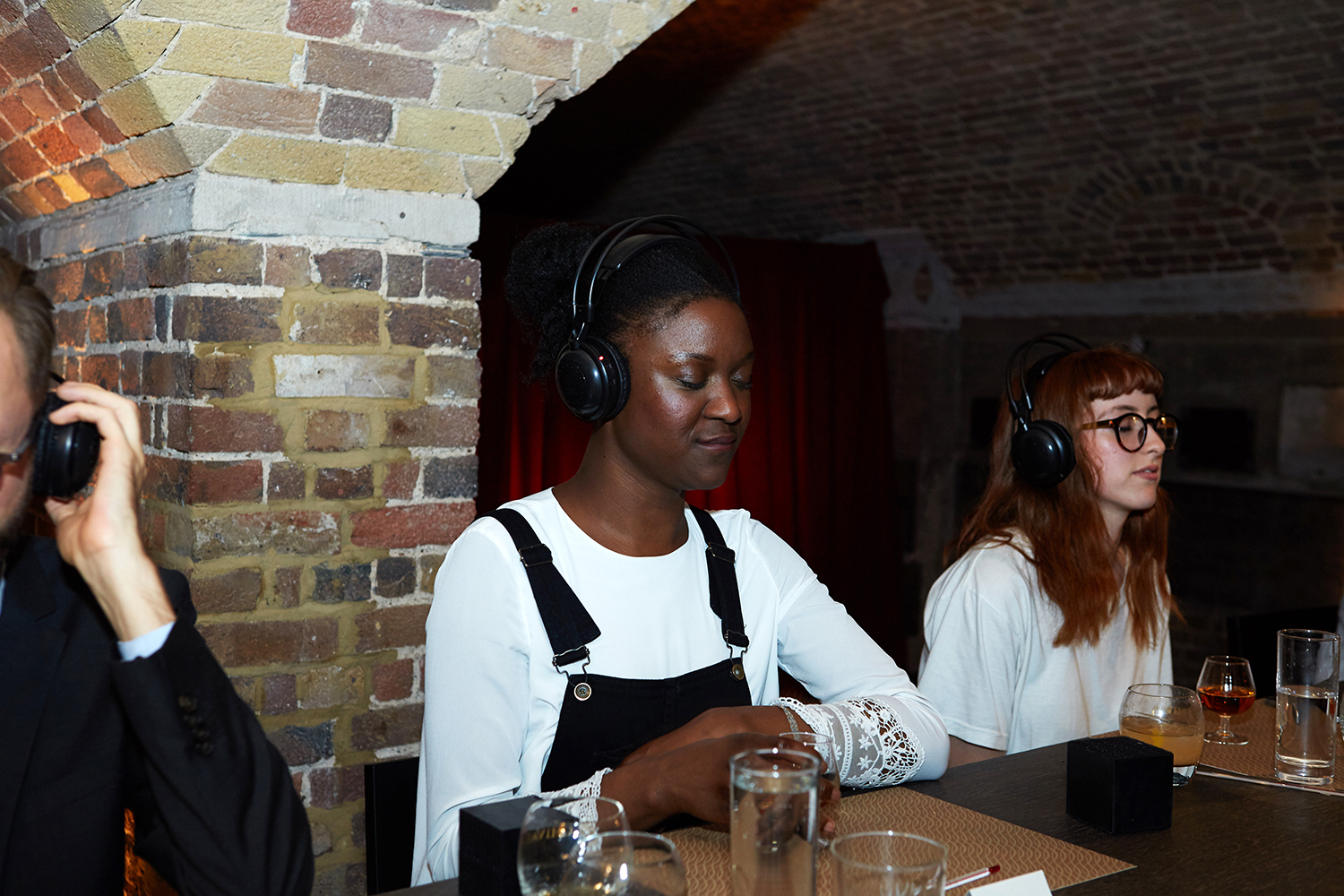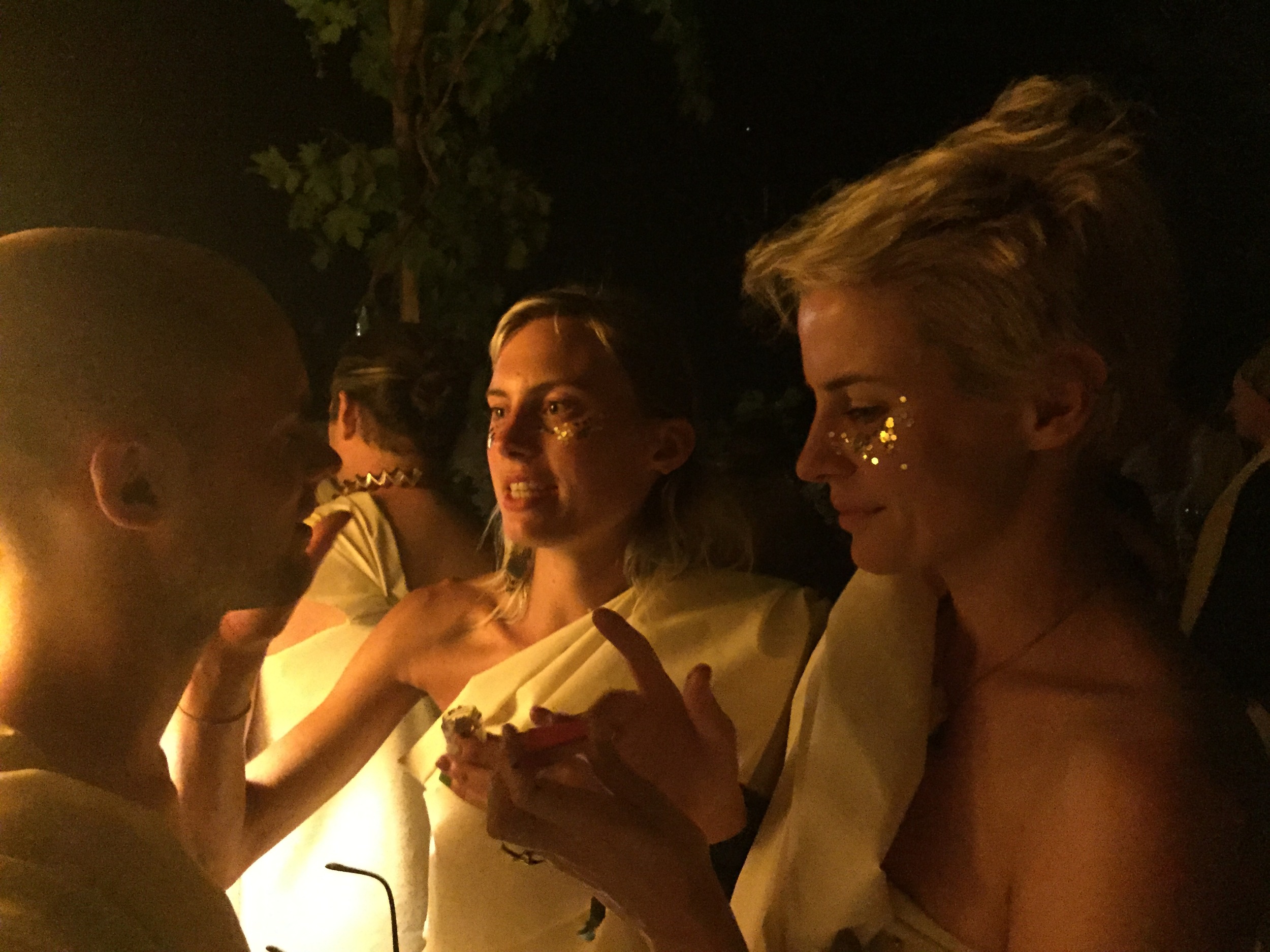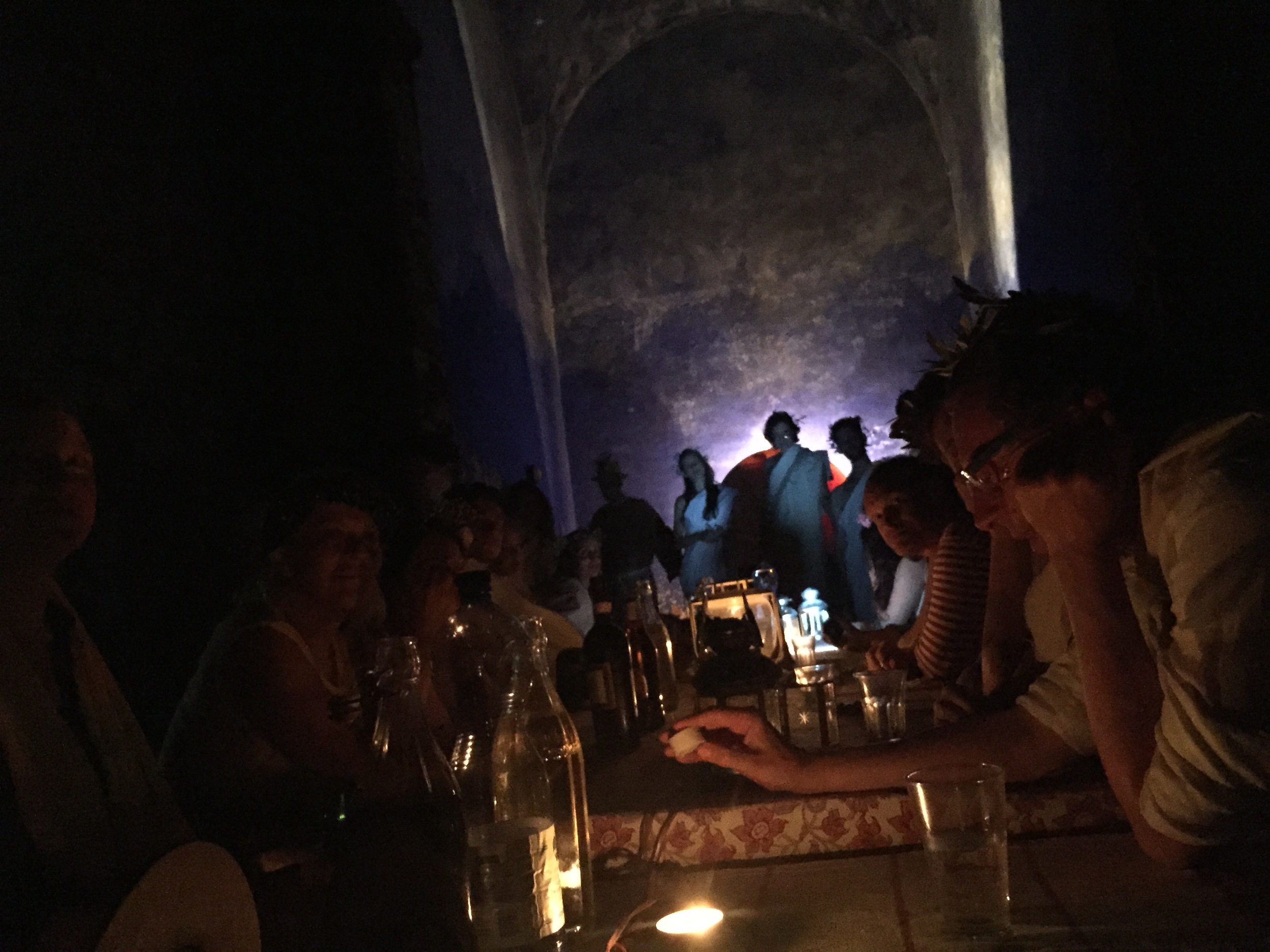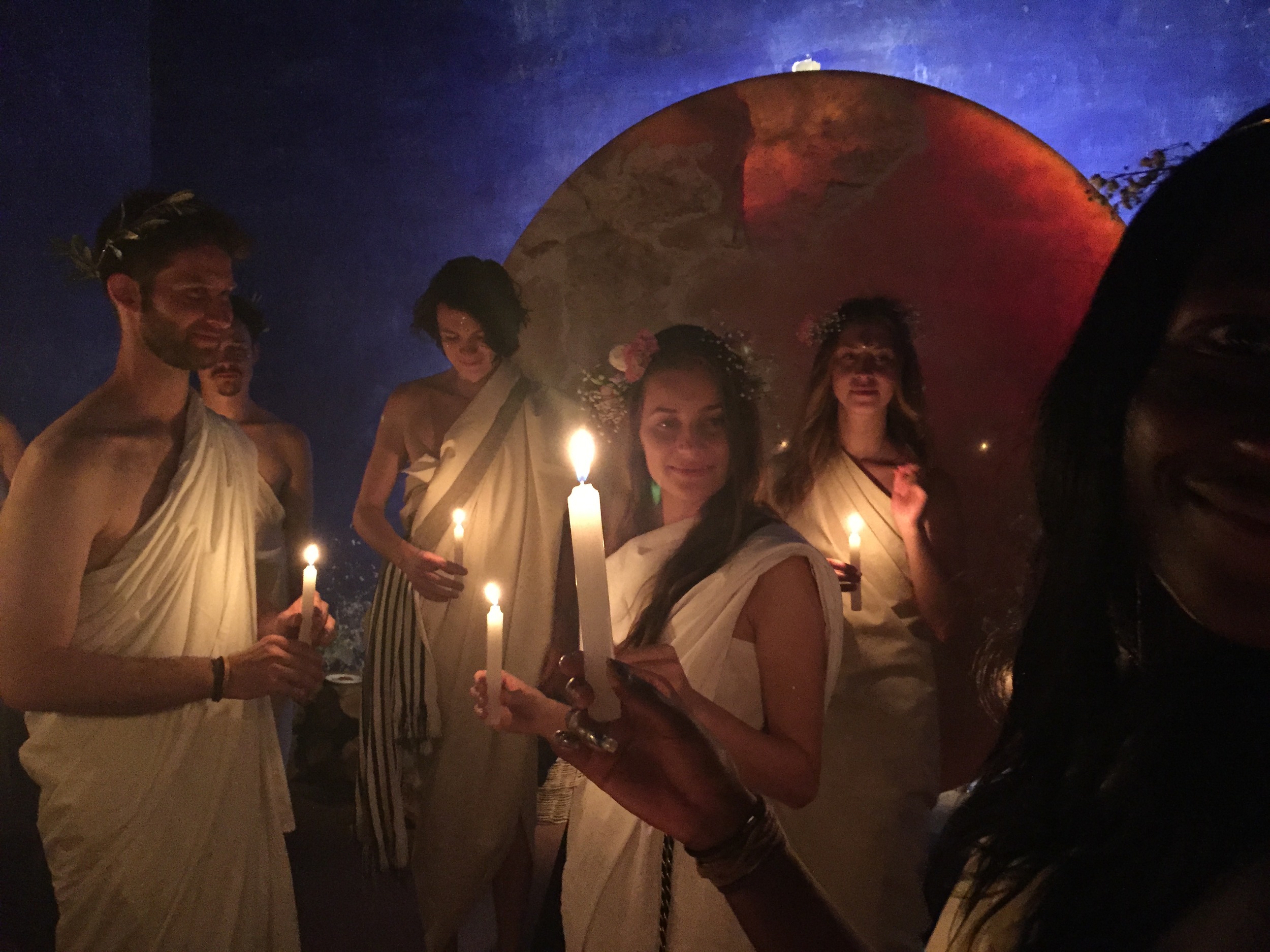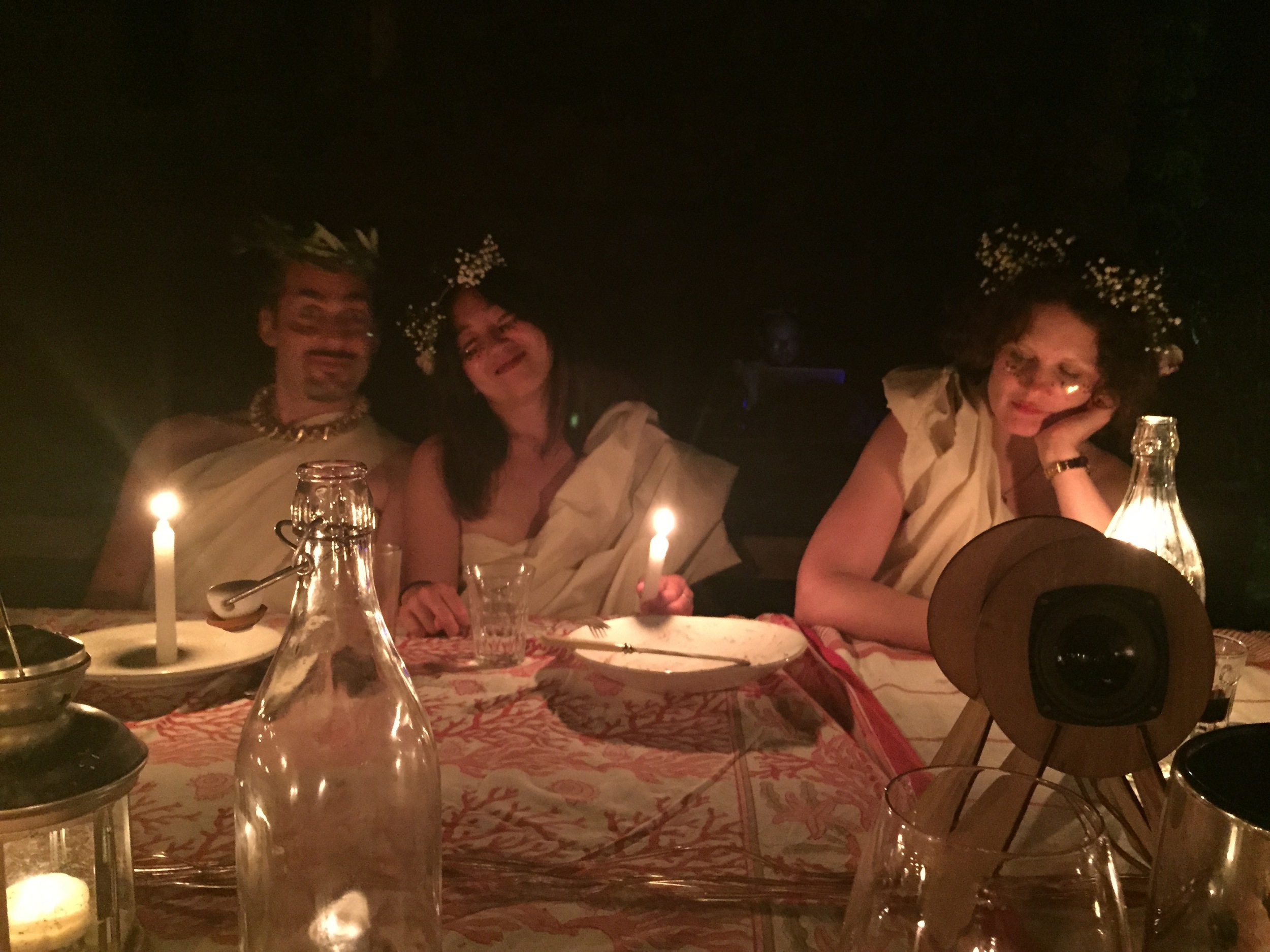
The Experience
We develop multisensory dining experiences that we call food operas. The plate is the stage, as diners encounter a customized soundtrack that responds to their individual rhythms and decisions. Music pairings are delivered via a custom speaker array that positions the source of the sound as close as possible to the dish it accompanies, incorporating cutting edge music technology to achieve an unprecedently close synchronization of music with a meal. Every stream of sound is coordinated in harmony and rhythm by responsive, real-time software, transforming the entire dining area into a lush, immersive sonic environment. This merging of the senses encourages an intensified awareness, enhancing appreciation and enjoyment of not only music and food, but the overall atmosphere of the restaurant.
We consider food opera to be a whole new genre for aesthetic expression, capable of encompassing a wide range of narratives. In past events, we have explored the phenomenological links between the senses, interpreted poetry, and told the stories of local farmers. Food operas foster community in a unique way; since the music is linked to each diner’s actions, they become complicit in the experience themselves. We hope that participants emerge from a food opera with a heightened sense not only of the interconnectedness of their own senses, but also of the connections that link them to the people around them, as well as their place in the food supply ecosystem and the broader environment.
FOOD OPERA EVENTS
on the sensations of beer (2018)
A multisensory dining experience that puts the writings of pioneering 19th century German scientist Hermann von Helmholtz in dialog with contemporary researchers and poets to explore the links between the senses of hearing and taste, taking place at BRLO BRWHOUSE in Berlin on September 20, 2018, as the official banquet of the fourth Web Audio Conference.
MUGARITZ XX (2018)
A special collaboration with Andoni Luis Aduriz and his team at Mugaritz in San Sebastián, Spain. To celebrate their twentieth anniversary, we designed a system of intelligent plates with embedded sensors and music playback devices. These plates network together to play music in response to diners' actions, accompanying a dish that resembles an acorn embedded in amber. The dish was first served on June 13, 2018, and will remain part of the 20+-course tasting menu for the rest of the year. More information about this unique project is forthcoming!
Le Dîner des Amazones (2018)
Our second collaboration with the Boston Symphony Orchestra and chef David Verdo, this work takes as its point of departure French Romantic composer Étienne Méhul's overture to his opera Les Amazones, presented as a pre-concert dining event at Symphony Hall, January 6 and 9, 2018.
quiver, pop and dissolve: three essays in gastromorphology (2017)
A collaboration with Jozef Youssef of Kitchen Theory in which the soundtrack to the dining experience was delivered via participants' mobile devices. Premiered at the third Web Audio Conference, Queen Mary University of London, August 21, 2017.
ploughman's lunch: an aural reconsideration (2017)
A collaboration with David Matchett of London's Borough Market. Premiered at the Oxford Symposium on Food and Cookery, July 9, 2017.
Music + Food Class (2017)
A complete summer semester course on the food opera project, presented through Berklee College of Music's Institute for Creative Entrepreneurship. Classes took places in Berklee's Dining Hall, and students worked with chefs on regular food scoring exercises in preparation for a final project scoring a four-course meal in collaboration with chefs at America's Test Kitchen.
cena concertante alla maniera di vivaldi (2017)
A culinary remix of Vivaldi's Piccolo Concerto in C, RV 443, developed in collaboration with the Boston Symphony Orchestra and chef David Verdo, presented as a pre-concert dining event at Symphony Hall, January 5 and 7, 2017.
Untitled cocktail #3 (2016)
November 30, 2016. A collaboration between Ben and Café ArtScience's award-winning bartender Todd Maul. Presented in the context of Ben's presentation "Food Opera: Exploring Audiogustatory Correspondences" at Le Laboratoire, part of the Non-Event curated 2016-2017 speaker series.
The Saint Paul Food Opera (2016)
October 6-8, 2016. A collaboration between composer Ben Houge, acclaimed new music ensemble Zeitgeist, and some of St. Paul's most well regarded chefs and food purveyors: Leonard Anderson of Tongue in Cheek; Adam Eaton of Saint Dinette; Cheyenne Broughton, pastry chef of Handsome Hog; Tracy Brice of Golden's Lowertown Deli; Izzy's Ice Cream; and Brake Bread. This event is supported by a Knight Foundation grant and a Berklee Faculty Fellowship. For more information visit http://www.zeitgeistnewmusic.org/saint-paul-food-opera.html.
The santa Croce Food Opera (2016)
Developed and presented as part of the First Crossmodalist Symposium, which took place on July 26-31, 2016, at Santa Croce, a former monastery on the outskirts of Batignano in Tuscany and home to British sculptor Emily Young. Sounds of the surrounding landscape blended with the voices and rituals of the community, accompanying a meal of local ingredients by Charles Michel, one of the Crossmodalism founders.
Vinfonies (2015)
Ben composed a new piece of music to accompany a 2012 Azul y Garanza Garciano as part of this annual event near Barcelona, September 24-27, 2015.
Opera Tech Workshop class (2015)
In the summer of 2015, Ben taught a class at Berklee College of Music’s Valencia campus, exploring the technology behind his food operas as well as the science and aesthetics of pairing music and food. Students presented their final projects in the context of an eight-course tasting menu at Quique Dacosta’s Michelin-starred restaurant El Poblet.
The Search for Metaphorical Matchings through Wine and Music (2015)
Ben collaborated with Janice Wang of Oxford University’s Crossmodal Research Laboratory and Alistair Cooper of 1855 Wine Bar on an event that paired music with six different wines as part of an experiment to see how sound affects the perception of taste, February 23, 2015.
Beside the White Chickens: A Summer Food Opera (2013)
Our third collaboration with chef Jason Bond took place at his Bondir restaurant in Cambridge, MA, on July 30, 2013. The five-course menu featured chicken supplied by Pete and Jen’s Backyard Birds of Concord, MA, and was loosely inspired by William Carlos Williams’ poem “The Red Wheelbarrow,” with prominent contributions from sous chef Rachel Miller.
Sensing Terroir: A Harvest Food Opera (2012)
Our second collaboration with Jason Bond, and the first at Bondir, incorporated field recordings from the local farms that provide his ingredients and interviews with the farmers, presented via a 30-channel speaker array, considering a meal from the standpoint of sensory ethnography and applying the “farm to table” ethos to sound. The event took place on November 13, 2012.
Food Opera: Four Asparagus Compositions (2012)
Our first public event took place on May 22, 2012, our first collaboration with Jason Bond, as the final event in a food and design series at Harvard’s Graduate School of Design, curated by Jutta Friedrichs, Lizzie MacWillie, and Sara Hendren.
Shanghai Workshop (2010)
While living in Shanghai, Ben invited a group of artists, curators, and friends to participate in a workshop presented in collaboration with chef Caroline Steger, developing an idea that had been gestating since 2006. Ben composed music based on the multicourse meal and influenced by the ensuing discussion, some of which was incorporated into the first public event at Harvard.
Additional Presentations
- Presentation at Boston Tech Poetics, July 10, 2018
- Science by the Pint: Original Gravity, a discussion hosted by Keith Kirchoff, hosted by Aeronaut Brewery (listen to the podcast here), January 18, 2018
- Food Opera presentation at HUBweek in Boston, including music paired with a chocolate mochi by chef Tracy Chang delivered via audience members' mobile phones, October 14, 2017
- "Web Audio in the Dining Room," presented at the third Web Audio Conference, Queen Mary University of London, August 21, 2017
- "The Sonic Landscape of Food: Imaginary Landscapes and Virtual Terroir," presented at the Oxford Symposium on Food and Cookery, July 9, 2017
- Workshop with La Fura dels Baus and Mugaritz, Badalona, Spain, July 2-5, 2017
- Music consulting for tasting events at Dr. Frank Winery in the Finger Lakes region of New York, in collaboration with Dr. Janice Wang of Oxford's Crossmodal Research Laboratory, summer 2017.
- Kitchen as Studio, Restaurant as Stage: Exploring the Links Between Music and Food, Berklee ICE Creative Entrepreneurs Conversation, a panel featuring Jason Bond, Tracy Chang, Brother Cleve, and Youji Iwakura, moderated by Ben Houge, Berklee College of Music, April 20, 2017
- Food Opera: Art, Technology, and Perception in the Dining Room, ArtTechPsyche III, Harvard University, April 20, 2017.
- Cooking up Ideas: A Conversation with Mugaritz, panel discussion at MIT, November 2, 2016
- The First Crossmodalist Symposium, Santa Croce, Batignano, Tuscany, Italy, July 26-31, 2016
- Percepción Sensorial y Arte Culinario in collaboration with Mugaritz, Miramar Palace, San Sebastián, July 13-15, 2016
- Art Technology New England, Boston Cyberarts Gallery, February 24, 2016
- Berklee Teachers on Teaching, including a three-course meal with musical accompaniment, developed in collaboration with chefs at Berklee’s new dining hall, January 11, 2016
- Hugo Boss fragrance event, in collaboration with chef Jozef Youssef of Kitchen Theory, London, England, November 17, 2015
- Chivas whisky tasting event with chef Jozef Youssef, London, England, September 16, 2015
- Presentation to the R&D team at Mugaritz, San Sebastián, Spain, August 7, 2015
- Presentation to the R&D team at the Fat Duck, Bray, England, June 29, 2015
- Oxford University, Crossmodal Research Laboratory, February 24, 2015
- Invisible Places Sounding Cities conference, Viseu, Portugal, July 18-20, 2014
- TEDx Berklee Valencia, Valencia, Spain, June 21, 2014
- The Second International Workshop on Musical Metacreation, Northeastern University, Boston, USA, October 14-15, 2013
- Harvard University, Graduate School of Design, presenting alongside chef Jason Bond as part of our first public food opera, May 22, 2012
Publications
“The Influence of Music on the Perception of Oaked Wines: A Tasting Room Case Study in the Finger Lakes Region” by Janice Wang, Meaghan Frank, Ben Houge, Charles Spence, and Kathryn Anne LaTour
Presented at the 12th Annual American Association of Wine Economists Conference 2018, Ithaca, New York, USA, June 10-14, 2018
“Web Audio in the Dining Room” by Ben Houge
Presented at the third Web Audio Conference, Queen Mary University of London, August 21-23, 2017
“Quiver, Pop, and Dissolve: Three Essays in Gastromorphology” by Ben Houge
Presented at the third Web Audio Conference, Queen Mary University of London, August 21-23, 2017
“The Sonic Landscape of Food: Imaginary Landscapes and Virtual Terroir” by Ben Houge
Presented at the Oxford Symposium on Food and Cookery, July 7-9, 2017
The following four articles, published as a series in NewMusicBox in November 2015, provides a fairly comprehensive overview of the project to date.
“Tasting Notes,” November 2, 2015
“Bridging Gastronomy and Art Requires Making Connections,” November 9, 2015
“Vinfonies, Nessun Dorma, and Gastromorphology,” November 16, 2015
“Complicity and the Chemical Senses,” November 23, 2015
“Food Opera: Transforming the Restaurant Soundscape” by Ben Houge
Presented at the Invisible Places Sounding Cities conference in Viseu, Portugal, July 18-20, 2014
“Food Opera: An Approach to Scoring Everyday Life” by Ben Houge
Presented at TEDx Berklee Valencia, June 21, 2014
“Food Opera: Merging Taste and Sound in Real-Time” by Ben Houge
Published in NewMusicBox, September 11, 2013, incorporating material from the MUME 2013 paper below.
“Food Opera: A New Genre for Audio-Gustatory Expression” by Ben Houge and Jutta Friedrichs
Presented at the Second International Workshop on Musical Metacreation (MUME 2013), which was held at the Ninth AAAI Conference on Artificial Intelligence and Interactive Digital Entertainment (AIIDE 13), Northeastern University, Boston, Massachusetts, October 14-15, 2013
"Food Opera Manifesto" by Ben Houge
Published on Ben's blog, Aesthetic Cartography, October 19, 2012
Press
"How Shapes and Sounds Can Change What You Taste"
Molly McDonough, Culture, May 9, 2018
"Ben Houge of Berklee Pairs Meals with Music in Food Operas"
Jenna Pelletier, Boston Magazine, April 11, 2018
"Food Operas Elevate the Art of Eating"
Alison Arnett, The Boston Globe, January 22, 2018
"Ben Houge: Symphony for the Devilled"
Tom Jenkins, Fine Dining Lovers, November 7, 2017
"How Music Can Influence the Way We Eat"
Rafael Tonon, Foodlosofers, November 7, 2017
"Berklee Students Compose Music for a Feast"
Cristela Guerra, The Boston Globe, August 25, 2017
"At Berklee, Scoring a Meal like It Was a Movie"
Kristin Toussaint, Metro Boston, August 9, 2017
"Music Class Teaches Students to Score Meals"
Elisabeth Sherman, Food & Wine, August 3, 2017
"¿La escasez nos hace ser más creativos?"
Andoni Luis Aduriz, El País, February 10, 2017
"How Kitchen Sounds Influence Food Flavor"
Allison Aubrey, NPR's All Things Considered, December 24, 2016
"Taste with your Ears"
Molly Birnbaum, Cook's Science, December 19, 2016
"Ben Houge’s Food Operas Turn Your Plate into a Stage"
Theresa Beckhusen, Paste Magazine, December 7, 2016
"Connecting Communities through Unexpected Pairings"
Ira Brooker, Knight Foundation Blog, September 26, 2016
"What's Cooking: St. Paul Food Opera Debuts"
Kim Ode, Minneapolis Star Tribune, September 22, 2016
"St. Paul's Musical Meals Let Diners Taste Food-Sound Pairings"
Nancy Ngo, St. Paul Pioneer Press, June 29, 2016
"St. Paul Food Opera looks to heighten the dining experience"
Levi Weinhagen, Knight Foundation Blog, April 30, 2015
"From Food Operas to Video Game Scoring, Making Interdisciplinary Connections through Music"
Alison Arnett, Berklee News, March 26, 2015
"Explainer: Interactive Composition"
Oliver Bown, The Conversation, November 25, 2014
"Rising to the challenge, St. Paul artists will split $1.4 million from Knight Foundation"
Mary Abbe, Minneapolis Star Tribune, September 30, 2014
"Top 5 Audience Participatory Opera Experiences"
Amanda Angel, WQXR, May 1, 2014
"Sounds of the Farm Accompany Diners at Bondir's Food Opera"
Allison DeAngelis, Cambridge Chronicle, August 8, 2013
"Boston Date Night Pick"
Mara Littman, Boston Herald, July 29, 2013
"A Sound Diet"
Jon Irwin, Kill Screen, June 20, 2013
"Sensing Terroir: Where Taste and Sound Collide"
Becky Tachihara, Dig Boston, November 12, 2012
"Feast for the Senses: MDesS students host Food Opera at the GSD"
Harvard GSD News, July 2, 2012
"Asparagus: a food opera"
Michael Mackenzie, Australia Radio National First Bite, June 16, 2012
"The Sound of Asparagus, as Explored through Opera"
Eyder Peralta, NPR, June 1, 2012
Ben Houge
Composer, Sound Artist, Professor
Originator of the Food Opera project
Ben Houge has been sharing his vision for connecting music and food internationally since 2010, not only in his acclaimed food opera events, but also in presentations at institutions and universities (including Harvard and Oxford), at academic conferences (The Oxford Symposium on Food and Cookery, MUME, the Web Audio Conference), and at some of the world’s leading restaurants (such as The Fat Duck and Mugaritz). He also works as a food and music consultant, having composed music for whisky and perfume. While there has been an explosion of interest in pairing food with other art forms in recent years, Ben’s work goes beyond the mere observation that senses can be linked to consider what kinds of new experiences are enabled and what kinds of stories can be told.
Ben is also focused on how new technologies can allow music to be tightly coordinated with a meal in time and space to an unprecedented degree. He draws from his experience designing audio for the video game industry, where questions of indeterminacy and interactivity are a matter of day-to-day business, at companies including Sierra, Microsoft, and Ubisoft since 1996. Highlights from Ben’s video game career include composing the classic string quartet soundtrack for Arcanum: Of Steamworks & Magick Obscura (2001) and developing an innovative cell-based music engine as audio director of Tom Clancy’s EndWar (2008).
In addition to his work with chefs, Ben’s other compositional concerns include networked music for audience mobile devices, multichannel sound installations, generative video, and music for dance, including a sixteen-channel soundtrack for New Movement Collective’s Please Be Seated, a commission from Southbank Centre premiered in London in 2014. Ben has also composed extensively for choirs, including commissions from Emmanuel Church in Boston, the Minnesota Compline Choir, and the Esoterics, and he finds grounding in contrasting his high tech pursuits with the lowest tech form of music making that exists.
Ben grew up studying classical piano, writing pop songs, and fiddling with synthesizers. He holds degrees in classical music composition from St. Olaf College and the University of Washington, and he is currently an associate professor in the Electronic Production and Design department at Berklee College of Music. He recently returned to the Boston area after two years in Spain, where he helped to establish and develop curriculum for the Music Production, Technology, and Innovation master’s program at Berklee’s new campus in Valencia. There he investigated Spain’s culinary landscape and incorporated concepts from the food opera project into his teaching; students presented their final projects for one class in the context of an eight-course tasting menu at Quique Dacosta’s Michelin-starred restaurant El Poblet.
Ben has lived around one third of his life outside of the US, including six years developing video games in China and six years growing up in the West African countries of Liberia and Ivory Coast, and this multicultural perspective deeply informs his approach to interdisciplinary and multisensory collaboration. More information is available at benhouge.com.
Production team
Jutta Friedrichs
Producer, Curator, Designer
Jutta Friedrichs designs the speaker centerpieces and other visual elements of the food opera events, in addition to managing the production and communications. She has visited farms to conduct interviews with the farmers growing the food, part of her ongoing inquiry into people, public space, urban infrastructure, and the built environment; these recordings have been incorporated into past food operas. In addition to her work on the food opera project, Jutta is active as an artist, writer, and curator. In her writings and multichannel audio-visual installations she explores cultural and phenomenological interrelations between the body and its surroundings, and as a curator, she helped organize Boston's massive Illuminus Festival.
Jutta holds degrees from Central Saint Martins College of Art and Design and the Harvard Graduate School of Design, and she is currently a mentor at the Harvard Innovation Lab. From 2005 to 2010, she lived in Shanghai, China, where she founded Mü Furniture as an outlet for her award-winning designs. She is the cofounder of Changing Environments, a company developing smart urban furniture, whose first product, Soofa, was launched at the White House's first Maker's Faire and has been well received in publications such as The Washington Post, Mashable and Fastcompany.
http://www.juttafriedrichs.com/About
JANICE (QIAN) WANG
Wine Expert and Researcher at Oxford’s Crossmodal Research Laboratory
Janice assisted with a myriad of details for the two Bondir events and collaborated on a wine and music pairing event in Oxford in 2015. She is also president of Oxford's Blind Tasting Society.
https://www.psy.ox.ac.uk/team/qian-wang
Stephan Moore
Sound Artist and Composer
Stephan is a lecturer in Sound Art and Sound Design at Northwestern University and an accomplished composer of music for a wide range of media, including extensive work in the field of dance. He helped operate the software at the two Bondir events and contributed the use of his unique, custom-built hemisphere speakers.
Enrique Gonzalez Müller
Producer, Engineer, Arranger
Enrique is a professor in Berklee's Music Production and Engineering department and a Grammy-winning producer. He engineered recording sessions for the Bondir food operas and provided support on the speaker configuration.
Thanks also to all of the musicians who have contributed to the food opera project over the years, including Melissa Howe, viola; Ro Rowan, cello; Fernando Brandão, flute; Peter Cokkinias, clarinet; Margaret Phillips, bassoon; Sergio Martínez, percussion; Victor Mendoza, marimba; and the members of Zeitgeist. Thanks also to the photographers who have documented our work, in particular Melissa Rivard and Andrew Janjigian.
collaborators
JASON BOND, BONDIR
http://www.bondircambridge.com/
Tracy Chang, Pagu
david matchett, borough market
Jozef Youssef, Kitchen Theory
Zeitgeist
http://www.zeitgeistnewmusic.org
The Boston Symphony orchestra
VINFONIES
The Crossmodalists
Frequently Asked Questions
Q: I love opera! So there must be a lot of singing, right?
Ben Houge: Actually, a food opera doesn’t necessarily include singing. I use the word for its multimedia associations; opera (along with video games and film) is one of the most all-enveloping art forms that we've got, involving music, drama, text, choreography, visual art, etc. I use the term to draw attention to the fact that I’m bringing together food, music, design, and technology in a completely new way that engages even more senses than a traditional opera.
But, yes, I totally love opera, too! Some of my favorite performances of 2015 were Berg’s Lulu at the Met Opera in NYC and Keeril Makan’s new opera based on Ingmar Bergman’s film Persona at MIT.
Q: But are there live musicians performing while people are eating? Kind of a dinner theater thing?
BH: Actually, the music emanates from speakers at each diner’s seat; there are no live performers, other than myself and sometimes another collaborator watching the room and operating the software (a bit like a DJ, I suppose). This project is about achieving an unprecedented synchronization between music and a meal, and so instead of having music coming from a stage on the other side of the room, I set it up this way to bring the music as close as possible to the food: the plate is the stage.
While I love going to live music concerts, I feel that having live musicians present in the restaurant can divide diners’ attention in a way that detracts from the nuanced sensory experience we're trying to convey.
Q: So the music is prerecorded? You just press play on an iPod at the beginning of each course?
BH: “Prerecorded” isn’t really the right term. The music is based on recordings I’ve made of acoustic musicians, but it’s being deployed by a real-time software system I developed. This allows me to respond to the unpredictable timings of the dining room; I can’t know in advance what dish someone will order, or when it will arrive, or how long it will take someone to eat it. So I wrote a program that lets me start each piece of music at the touch of a button, and it will continue indefinitely until I tell it to stop. It functions kind of a like a loop, but it never repeats itself; the software is constantly generating new, natural-sounding variations that won’t get annoying or repetitive. This software builds on techniques I've developed in my career designing audio for video games since 1996; like a video game soundtrack, it's somewhere between "live" and "prerecorded."
Q: If the sound is coming through speakers, couldn’t it be anything? Why use traditional instruments?
BH: I feel like the real-time processing I’m doing to my recordings mirrors the kind of alchemy that happens in a kitchen. You start with raw ingredients and then transform them into something new that nonetheless bears vestiges of the original materials. Some sounds are manipulated more than others. One piece I developed uses a recording of a hulusi, a reed instrument from China; the sound is pitch-shifted and arpeggiated and otherwise manipulated beyond recognition, but it retains a nice organic quality. Using these instruments also situates what I’m doing within a certain musical tradition.
But we’re not limited to traditional, acoustic instruments by any means. In some projects we’ve also incorporated field recordings from the local farms providing the ingredients and interviews with farmers, applying the “farm to table” ethos to sound as a kind of sensory ethnography.
Q: Does everybody have to eat at the same time?
BH: No, it’s asynchronous, just how people typically eat in a restaurant. Of course the system can also support a synchronized experience, but at our longest events, we took reservations anywhere between 5 and 10pm, and people would start their meal whenever they arrived. This means that you could be on your first course, while someone else is on their fourth, resulting in a kind of emergent exposition and recapitulation, based on the rhythms of the dining room.
Q: But if the music is synchronized with each person’s meal, and everyone’s eating different things at different times, won’t that sound totally cacophonous? Why not just use headphones?
BH: That’s the hard part! I write the musical textures for each dish to be modular, so that they will sound good in any combination. It’s a little bit similar to the way you might isolate the guitar, percussion, and vocal parts of a song. Since everything is coordinated by a central computer network, I can ensure that all of the music in the dining room is playing in the same key and rhythm.
There have been some interesting food and music pairings that use headphones (most famously Heston Blumenthal's The Sound of the Sea), but I avoid them for two reasons. First, it cuts you off from the rest of the dining room, so you're not able to share the experience with those around you (especially if someone else wants a bite). Second, headphones might work for one dish, but I think they'd start to get uncomfortable if you scaled this up to an evening-length experience.
Q: Are there certain kinds of food that work best? What kind of music goes with this burrito?
BH: I try to avoid foods that already have strong associations. I like to work with chefs who put together ingredients in creative and innovative ways that don’t overtly reference traditional dishes or culinary cultures. I feel like this helps people engage their senses, to tune in and really evaluate what they’re experiencing, since they can’t directly relate it to a past experience of the same dish. Particularly in ethnic restaurants, the association between traditional cuisine and traditional music is often reinforced in a way that can kind of short-circuit diners' critical faculties.
Q: Can you come do a food opera in my town?
BH: I’d love to! We’ve tried to design the system to be fairly portable, and I love meeting new collaborators. I’m happy to talk about developing a new piece, and I also have a repertoire of existing music for this format that we can present in collaboration with new chefs, just as a more traditional opera can be restaged in new productions with different sets, direction, and performers.
